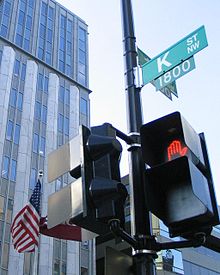
Back لابیگری در ایالات متحده آمریکا Persian Лоббизм в США Russian Vận động hành lang ở Hoa Kỳ Vietnamese 美國遊說 Chinese

Lobbying in the United States is paid activity in which special interest groups hire well-connected professional advocates, often lawyers, to argue for specific legislation in decision-making bodies such as the United States Congress. It is often perceived negatively by journalists and the American public; critics consider it to be a form of bribery, influence peddling, or extortion.[1][2] Lobbying is subject to complex rules which, if not followed, can lead to penalties including jail. Lobbying has been interpreted by court rulings as free speech protected by the First Amendment to the U.S. Constitution. Since the 1970s, the numbers of lobbyists and the size of lobbying budgets has grown and become the focus of criticism of American governance.
Lobbying takes place at every level of government: federal, state, county, municipal, and local governments. In Washington, D.C., lobbyists usually target members of Congress, although there have been efforts to influence executive agency officials as well as Supreme Court appointees. Lobbying can have a strong influence on the political system; for example, a study in 2014 suggested that special interest lobbying enhanced the power of elite groups and was a factor shifting the nation's political structure toward an oligarchy in which average citizens have "little or no independent influence".[3]
The number of lobbyists in Washington is estimated to be over 12,000, but most lobbying (in terms of expenditures), is handled by fewer than 300 firms.[4] A report in The Nation in 2014 suggested that while the number of registered lobbyists in 2013 (12,281) decreased compared to 2002, lobbying activity was increasing and "going underground" as lobbyists use "increasingly sophisticated strategies" to obscure their activity.[5] Analyst James A. Thurber estimated that the actual number of working lobbyists was close to 100,000 and that the industry brings in $9 billion annually, mostly from corporations.[5] Wall Street spent a record $2 billion trying to influence the 2016 United States presidential election.[6][7]
- ^ Robert Reich, June 9, 2015, Salon magazine, Robert Reich: Lobbyists are snuffing our democracy, one legal bribe at a time, Retrieved May 30, 2017, "...This second scandal is perfectly legal but it's a growing menace ... the financial rewards from lobbying have mushroomed, as big corporations and giant Wall Street banks have sunk fortunes into rigging the game to their advantage...."
- ^ Mike Masnick, April 12, 2012, Tech Dirt, Is Lobbying Closer To Bribery... Or Extortion?, Retrieved May 30, 2017,
- ^ Gilens, Martin; Page, Benjamin I. (September 1, 2014). "Testing Theories of American Politics: Elites, Interest Groups, and Average Citizens". Perspectives on Politics. 12 (3): 564–581. doi:10.1017/S1537592714001595. ISSN 1541-0986.
- ^ Cite error: The named reference
twsM21was invoked but never defined (see the help page). - ^ a b Lee Fang, March 10, 2014, The Nation, Where Have All the Lobbyists Gone? On paper, the influence-peddling business is drying up. But lobbying money is flooding into Washington, DC, like never before. What's going on?, Accessed March 21, 2014
- ^ "Wall Street spends record $2bn on US election lobbying". Financial Times. March 8, 2017.
- ^ "Wall Street Spent $2 Billion Trying to Influence the 2016 Election". Fortune. March 8, 2017.